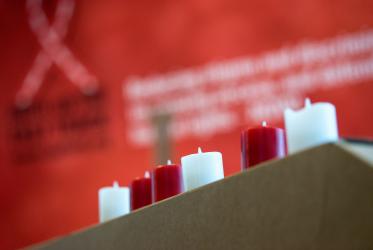Dr Ulysses Burley III is serving as a World Council of Churches (WCC) delegate to the 62nd Commission on the Status of Women at the United Nations in New York City (CSW62), being held 12-23 March.
Dr Burley, from Chicago, is a member of the Evangelical Lutheran Church in America. He currently serves on the WCC-Ecumenical Advocacy Alliance HIV Access to Treatment Working Group.
Q: Could you share a bit about your history as a CSW62 delegate for WCC?
Dr Burley: This is my third CSW. My first was in 2014 through the ELCA as part of a newly-formed young adult cohort centered around issues of justice, hunger, poverty and gender equality, among other issues. I then served as a WCC delegate at CSW59 and again this year. The CSW allows me to center my own feelings and thoughts about what my role is in pursuit of equity for all genders. We all have to take on responsibility related to this. I understand that as a man, I have a gender, too, and that my responsibility is to use my male gender - privilege - to right the ship as an ally to my sisters.
Q: How does your work on HIV and AIDS intersect with issues of gender equality?
Dr Burley: HIV/AIDS is an epidemic of women and girls as they account for more than half of people living with HIV worldwide. This disparity is most certainly because of gender inequality. Gender inequality impacts public health in so many negative ways.
Q: How can we all grow together in promoting gender equity? Are we making progress?
Dr Burley: Each year, I hear more and more from our member churches and civil society that we are getting closer to gender equality and gender equity. We have come this far by faith but we still have a long way to go. Ultimately the goal for any organization affiliated with the CSW is that we no longer have to have the CSW!
I truly believe progress has been made. We continue to have difficult conversations, and that’s a good thing. We’re moving closer to a place where sexual and reproductive health rights are recognized as human rights. It doesn’t necessarily have to be hinged on controversial topics. I think everyone would agree that death should not be a byproduct of pregnancy, yet some 830 expecting mothers die daily due to preventable circumstances related to pregnancy or childbirth. Together we can work to reduce maternal morbidity around the world. Doing so makes us more whole and more healthy, and as a result more productive citizens in the economy of life. We have the ability to change the narrative. I’m optimistic.
Q: What’s next?
Dr Burley: We continue create spaces such as the CSW in which we listen, learn, pray and discern. We hear the stories because the stories are the heartbeat of the work before us - lived experiences of oppression women and girls, men and boys, around the world that gives life to the issues that we sometimes trivialize, and reduce to mere talking points. These issues are the lifeblood of many in the world, particularly rural women and girls. We must honor them by listening and then acting justly.
WCC Ecumenical United Nations Office









